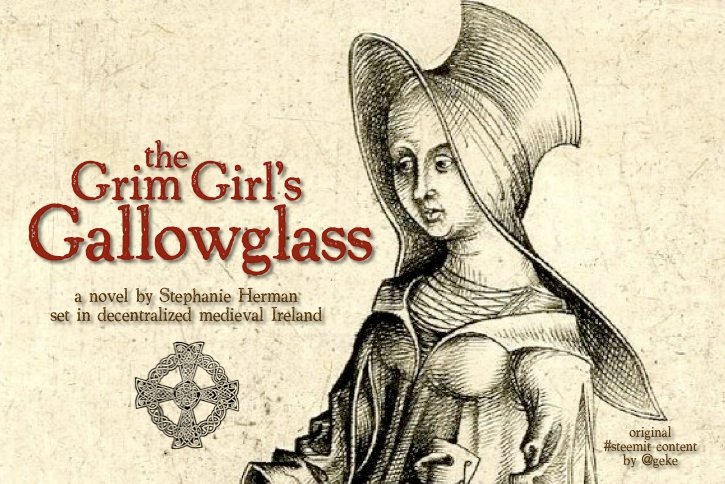her beauty's could-ness bit and pieced,
her virginity questioned over mugs of mead.

[ Chapter 1 was posted on my first Steemit account, but I've since consolidated all my work under my @geke account because that seems to work best on Steemit. ]
Pronunciation Key:
- Saoirse (SEER-sha)
- Leannán (LAN-awn)
- Uachtarán (OOK-ter-awn)
- Aoibhneas (EEV-nass)
- Draíocht (DREE-oct)
- Beochaoineadh (BAY-oh-keen-yu)

In the shire of Faodail, the tongues of folk were a-flutter for weeks divining the arrival of their laird's new wife. Her name was only wondered at, her beauty's could-ness bit and pieced, her virginity questioned over mugs of mead. The greatest speculation in Faodail was a wagered guess at the hue of her hair.
Some folk worried more soberly where this new wife might be put. Faodail was peopled enough. Was he really going to keep her castled? What of Beochaoineadh? She was Leannán's wife for a year over last and the shire folk had warmed to her. The grounds had vined up verdant since she'd come. She brought the green with her, and green was life.
This new wife would also bring gallowglass, and their keep would be costly. The older folk just off the lane would need to shift their households to make room for these men. It was decided that if any of the men brought a family, they could share a widow's cottage, but the untamed and unmarried, what Mealladh called the "shrewless men," could be wedged into the lodge by the castle gate.
“Best breede those goats!” was everyone's solution, given to the goat-herder Beagan, who thought it a painfully slow response to such an immediate need. He did, though, trod the shire for many days collecting coins from the worried, in order that they could pay for a twelfth cow at the autumn faire in Tamlaght O'Crilly.
For some, the promise of gallowglass birthed hope. Young Maren hoped to finally be trothed, and two of the shire's young widows had been noticed cleaning more thoroughly than usual. Bodices were laced tighter. Hairbrushes were grasped. Berries were left swollen on the vine. The older women, as older women do, preferred thoughts of spirits over thoughts of men. Devoted as they were to the Tuatha Dé Danann, they nurtured two fears. Some worried the new wife might not stay if she didn't feel welcomed by the faeries. And the others warned this new wife might anger the faery folk, and sow contempt in the soil. For them, the busyness of preparation for the new lady's arrival focused solely on tree bribery. They left all manner of gifts hanging on branches – bundles of dried herbe and stony beads of indigo and lavender-stemmed wrist-lace and amber dust. It was a time of great anxiety.
Up in the castle, the tongues had been fluttering, too, though perhaps more quietly. Nádúrtha, the cook, was the only one who did no speculating. She worked without words, just as she had always done. When Sir Leannán had told Nádúrtha to accompany the stable boy on a journey to gather the new lady at Lord Uachtarán's castle in the north, her only answer was a nod. Mellen, the stable boy, had hoped the journey would take them past a public house, but Nádúrtha held the reins. She wanted to be back before dark, as she had always feared the evening clouds.
The three, Saoirse, Nádúrtha, and Mellen, arrived at Faodail just as the sun was setting. As their clackety wagon entered the low gate, a wisp of smoke was rising from the lodge chimney. The slow wheels ambled up the narrow castle road. On either side grew a row of muscular beech trunks. Like great arms, their entwined branches reached up and over, clasping one another into canopy. From this tangle of trees, Saoirse caught her first sight of the tower. Its forward wall was slitted with lupin sunbays, a name (she now told Nádúrtha) that she'd given arrow loops as a small child.
“I'll start a fire, miss,” responded the cook.
“It's Lady now, Nádúrtha. I'm not a miss anymore.” Saoirse stepped down from the wagon and placed her foot on land that now belonged to her. All this, she thought, for the utterance of a phrase. The power of spoken words.
Saoirse followed Mellen through the castle door that hung open like a wound. It swung on large black hinges that looked like the anchors of a ship. Its through led into a large kitchen where Nádúrtha was standing at the hearth with a poker. As the fire grew, sparks flitted themselves into what looked to an exhausted Saoirse like scrivened swirls of illumined gold ink.
“Up t'ree flights, miss. We'll git the fire a-goin' up t'ere, as well.”
Saoirse trailed Nádúrtha up the spiral stairs and found, finally, a chilled chamber and a hard bed. Mellen had stacked her trunks against the wall. “Not 'miss,' please, Nádúrtha. I'm the lady now.”
The cook reacted as someone might react who's deaf. After she renewed the fire there, she left Saoirse with an assurance: “He'll unstack in the morn'.” The lady of the castle sank a'sleep as the esophagus of stairs swallowed Nádúrtha.

Over the next few days Saoirse kept herself busy waiting for her gallowglass and her new husband to arrive at the castle. She found little clusters of pennywort sprigging out from a creviced rock every here and there. A tendriled garden was bordered off with smooth stones and carpeted with thyme. The last of the winter wheat was almost ready for harvest. Saoirse had nothing to do in the castle, so she took it upon herself to take the vegetable scraps and dead leaves to a peck of chickens she sometimes saw wandering about on the lane. This lane led to a company of stream-nestled cottages. When she ventured there, the cottage girls would hold her back by asking question after question about her home and the wedding and all the warrior men in her retinue.
As she was heading back toward the castle, an older woman bustled quickly up. “Lady Sarsfield!” Saoirse turned and saw a round face wrapped in dirty headscarf. In her hand, she held four smooth stones that she had left to soak for many days in blackberry juice. It stained the stones blue. She now pressed them into Saoirse's hand.
“You needn't pay me a gift, good woman,” Saoirse objected.
“No, mum, the gift is not for you. Take it, please, and offer these to the faery folk.”
“They charge rents?” Saoirse laughed. “Those are just tales.”
“No, miss. It's not just for your sake. If you anger the sidhe, they might bring back a lack on us.”
“Please, woman," said Saoirse, straightening herself, "address me as Lady. I'm the new lady of Castle Faodair.”
“I know who y'are, good lady. Please. The sidhe ain't nor to be trifled with.” Her task complete, her skirt bells jingled and she bobbled off on bare feet.

Faodair Castle was always cold, even on a day like this when the sun in Aduaine would shine down at a longer, glaring angle. The large tree on the castle's south end cast much of it in shadow. She climbed the stairs to the fourth floor and set the blue stones on a stool beside her bed. She stoked the fire. She opened the south shutters. The sun poured itself onto the wooden floor, and she warmed her toes in its splash. Soon, clouds filtered her warmth, and she left the window to find something woolen.
On the next floor up, she found a great hall, tall to its rafter beams. A fireplace, the size of a horse stall, gaped at the end of the hall, and before it, a long oak table besotted with benches and stools. Six-foot candle sticks, streaked with tallow, stood at attention along the side walls. A paned window looked out over the hill that slowly descended toward the village. Saoirse could see the the thatch of a hundred weary rooves and the kitchen smoke of a hundred weary women baking their breads and boiling their potatoes. Between Faodair and the town was a herd of plump sheep peppering the downsloping hill. This is my kingdom, she thought, and she wondered what she might do with this one.

The Celtic cross in the cover image is used with permission by the CC license of DR3W5K1 at officialpsds.com
Abstract Green Natural Background Vector Graphic Art from clipart.me.
